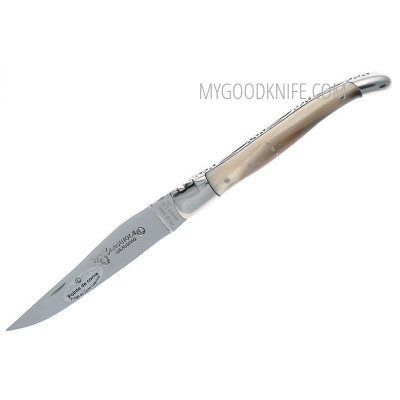Folding knife Laguiole en Aubrac Clover Laguiole L0212PCIT 12cm
-
Quick shippingWe ship worldwide! If order is placed on business day before 12-00 at Finnish time, we will do our best to ship it on the same day.
-
Easy paymentMyGoodKnife offers several payment options for your purchase: credit card or direct payment to bank account.
-
Secure shoppingMyGoodKnife is secured with SSL (Secure Socket Layer) certificate. Our webshop is encrypted with 128-bit SSL protection. When you move to the payment pages, your payment transaction is completely secure!
-
Customers supportContact our customer service via live chat, e-mail or contact form. We do our best to answer all requests in nearest time.
-
Return & RefundEU customers have the right to cancel order within 14 working days of delivery and return goods for a full refund (except cost of shipment).The goods must be return in saleable (unused) condition including package.
- Reference
- L0212PCIT
- Brand
- Laguiole en Aubrac
- Steel
- 12С27 Sandvik™ steel
- Handle
- Horn
- Blade Length, mm
- 120
- Hardness
- 56-58 HRC
- Lock
- Spring system
- Total length, mm
- 210
- Blade thickness, mm
- 3

Laguiole knives have been manufactured in the southwest French province of Aveyron since the nineteenth century. Its predecessor, the "Capuchadou", was forged with a fixed, unmovable blade. After the development of a unique folding mechanism by the smith Pierre-Jean Calmels, the blade was then able to fold into its handle, which lead to the creation of the folding knife, or jackknife. However, this beautifully curved jackknife originated not from France, but from seventeenth-century Spain, where it was called in original Spanish "navaja". Nearly everyone, be it man or woman, young or old, carried these knives with them at all times. In this unsettled period, it was used both as an all-purpose tool and as a weapon. Young French craftsmen from the Aubrac region, who had travelled through Andalusia to perfect their skills, saw these unusual knives and studied the art of their production. With this new-found knowledge and skill, they returned to their homeland where they continued to develop the knife. Beautiful carvings of flies and bees were forged into the knives, and the sheath received the so-called "shepherd's cross", made from metal pins. Being far superior to the old Capuchadou, these knives quickly became the shepherds' tool of choice during their solitary travels. They even stuck the knives into the ground or tree roots when they wanted to pray! The incredible craftsmanship, remarkable sharpness of the blade and extraordinary quality of the materials used all contribute to the knives' legendary status and are considered unique cultural property of France. No one who has owned such a knife will ever again want to use any other!






